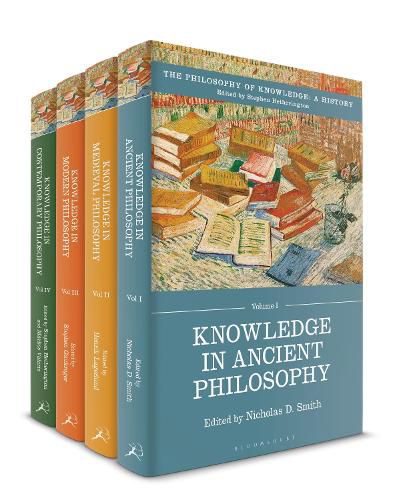Readings Newsletter
Become a Readings Member to make your shopping experience even easier.
Sign in or sign up for free!
You’re not far away from qualifying for FREE standard shipping within Australia
You’ve qualified for FREE standard shipping within Australia
The cart is loading…






Within these four volumes, we meet much of whatever epistemology has been and is. Why is this form of historical engagement philosophically important?
The Philosophy of Knowledge: A History presents the history of one of Western philosophy's greatest challenges: understanding the nature of knowledge. To know epistemology's history is to know better what contemporary epistemology could be and perhaps should be - and what it need not be and perhaps ought not to be.
Divided chronologically into four volumes, it follows conceptions of knowledge that have been proposed, defended, replaced, and proposed anew by ancient, medieval, modern and contemporary philosophers.
Each volume centers around three key questions: what conceptions of knowledge have been offered? Which have shaped epistemology in particular and philosophy in general? How is knowledge conceived by philosophers now? Together these volumes trace the historical development of knowledge for the first time, covering:
With original insights into the vast sweep of ways in which philosophers have sought to understand knowledge, The Philosophy of Knowledge: A History embraces what is vital and evolving within contemporary epistemology. Overseen by an international team of leading philosophers and featuring 50 specially-commissioned chapters, this is a major collection on one of philosophy's defining topics.
$9.00 standard shipping within Australia
FREE standard shipping within Australia for orders over $100.00
Express & International shipping calculated at checkout
Within these four volumes, we meet much of whatever epistemology has been and is. Why is this form of historical engagement philosophically important?
The Philosophy of Knowledge: A History presents the history of one of Western philosophy's greatest challenges: understanding the nature of knowledge. To know epistemology's history is to know better what contemporary epistemology could be and perhaps should be - and what it need not be and perhaps ought not to be.
Divided chronologically into four volumes, it follows conceptions of knowledge that have been proposed, defended, replaced, and proposed anew by ancient, medieval, modern and contemporary philosophers.
Each volume centers around three key questions: what conceptions of knowledge have been offered? Which have shaped epistemology in particular and philosophy in general? How is knowledge conceived by philosophers now? Together these volumes trace the historical development of knowledge for the first time, covering:
With original insights into the vast sweep of ways in which philosophers have sought to understand knowledge, The Philosophy of Knowledge: A History embraces what is vital and evolving within contemporary epistemology. Overseen by an international team of leading philosophers and featuring 50 specially-commissioned chapters, this is a major collection on one of philosophy's defining topics.